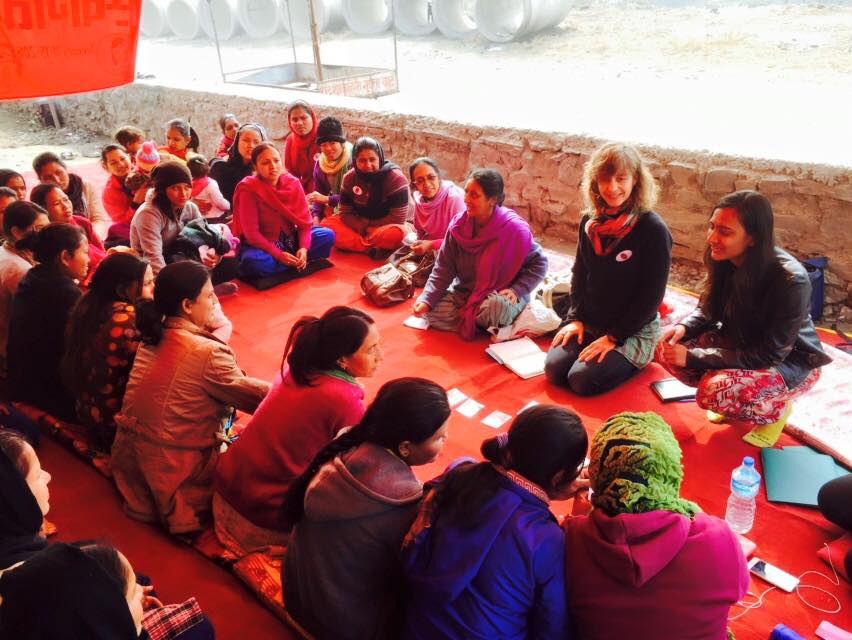NYU Design for America Members Collaborate with Youth in Nepal
NYU Design for America members meet with local women in Tripureshwor, Nepal, Jan. 2016. The university organisation is collaborating with youth groups in the Nepalese slum to provide comfort to women at night through the use of solar paint.
April 5, 2017
NYU Design for America members collaborated with two Nepalese youth groups to use solar paint to increase feelings of safety at night in Tripureshwor — a slum located in the capital of Nepal. Associate Tandon Professor and NYU DFA’s faculty advisor Anne-Laure Fayard said the women living in the area felt scared of leaving home at night.
A Tandon press release said that the initiative was inspired by the group’s most recent trip to Nepal in Jan. 2016. The press release said that the group traveled to Nepal as a part of The Bindi Project.
Their work on this project emerged from their participation with the OpenIDEO challenge on Women and Girls’ Safety. According to the press release, NYU DFA members met with women living in Tripureshwor during the trip to prototype ideas and concluded that the lack of lighting was a main concern in the community.
In response to this visit, Fayard said that she suggested the idea of creating a paint mixture that would absorb solar energy during the day and glow at night. After researching different options, Ph.D. student Ashwin Gopi found out that Europium-doped Strontium Aluminate and epoxy were the ideal materials needed to create the solar paint. The press release said it took several months to obtain these materials and then ship them to Nepal.
“Giving the women a sense of safety in their community is essential to allow them to learn new skills and explore financial opportunities, as well as develop self-confidence and leadership skills,” Fayard said. “The solar project ended up being a way not only [to] test a solution to increase the sense of safety of women in the community, but also to get young people in Nepal to take a human-centered design approach to solving problems in their community.”
The final mixture was used to paint arrows on the walls of a few select houses in Tripureshwor. According to the press release, the arrow prototype was chosen because it would allow the group to use less paint, and because the youth in Nepal wanted the arrows to allude to a sense of path finding — hoping to truly foster a feeling of safety among the Nepalese women.
NYU DFA members collaborated to use human-centered design to create solutions for this social issue. The youth groups on the ground — the Bhaktapur Youth Club and Sahayogi Saathis Youth Club — were key allies in the implementation of the project.
Several of the members of the Sahayogi Saathis Youth Group are the children of the women participating in the Bindi Project. They selected the houses to be painted, checking that these both received sunlight and were perceived as unsafe at night in order to properly test the paint’s effect. The youth groups also started literacy classes for the women and a video pen pal project with high school students in New York. Fayard believes that providing women with a sense of security is the foundation for self-development and an opportunity for community engagement.
Tandon Media Spokesperson Karl Greenberg said that Fayard has often involved students in award-winning projects in the past that have spanned the globe. He said that Fayard is able to share her love for human-centered design with students — especially when applying it to technology.
“Professor Fayard and doctoral candidate Ashwin Gopi’s participation on this important project bespeaks NYU Tandon’s commitment to technology in service to society, the polestar of nearly every area of inquiry here at Tandon,” Greenberg said. “This project, leveraging the design consultancy IDEO’s innovative OpenIDEO platform, evinces another core principle at Tandon — cross-disciplinary collaboration toward building unique, creative solutions to real-world problems.”
Email Adriana Tapia at [email protected].

























































































































































